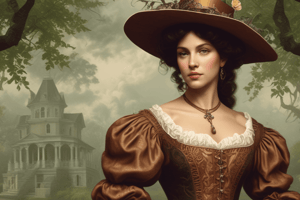Podcast
Questions and Answers
What was the approximate time period of the American Renaissance?
What was the approximate time period of the American Renaissance?
The 1830s to the end of the Civil War in 1865
What major social and political issue was becoming increasingly contentious during the American Renaissance?
What major social and political issue was becoming increasingly contentious during the American Renaissance?
The question of slavery
What philosophical movement, led by Emerson and Thoreau, emphasized individualism and a connection with nature?
What philosophical movement, led by Emerson and Thoreau, emphasized individualism and a connection with nature?
Transcendentalism
What was the title of Thoreau's essay that advocated for individual resistance to civil government in moral opposition to an unjust state?
What was the title of Thoreau's essay that advocated for individual resistance to civil government in moral opposition to an unjust state?
What was the main theme of Emerson's essay 'Nature' (1836)?
What was the main theme of Emerson's essay 'Nature' (1836)?
What major theme does Nathaniel Hawthorne's work often explore in the context of American history and culture?
What major theme does Nathaniel Hawthorne's work often explore in the context of American history and culture?
What is the significance of Herman Melville's 'Moby-Dick' in American literature?
What is the significance of Herman Melville's 'Moby-Dick' in American literature?
What is the central theme of Walt Whitman's poetry in 'Leaves of Grass'?
What is the central theme of Walt Whitman's poetry in 'Leaves of Grass'?
What is distinctive about Emily Dickinson's poetry?
What is distinctive about Emily Dickinson's poetry?
What philosophical movement had a profound influence on American thought and encouraged a distinct American philosophical identity?
What philosophical movement had a profound influence on American thought and encouraged a distinct American philosophical identity?
Flashcards are hidden until you start studying
Study Notes
The American Renaissance
- The American Renaissance was a period of cultural and literary flourishing in the United States, spanning from the 1830s to the end of the Civil War in 1865.
- This era marked a golden age in American literature and culture, characterized by a distinctly American voice and identity, separate from European influences.
Historical Context and Intellectual Foundations
- The American Renaissance took place during a time of significant social, political, and economic transformation in the United States.
- The United States was expanding westward, and the question of slavery was becoming increasingly contentious.
- The Second Great Awakening, a religious revival movement, inspired reform in areas such as abolition, women's rights, and education.
- Transcendentalism, a philosophical movement led by Ralph Waldo Emerson and Henry David Thoreau, emphasized individualism, nature, and the inherent goodness of humanity.
Major Literary Figures and Their Works
Ralph Waldo Emerson
- Considered the father of Transcendentalism, Emerson's essays, such as "Nature" (1836) and "Self-Reliance" (1841), challenged individuals to look within themselves and to the natural world for truth and inspiration.
- His work encouraged a break from European literary traditions and emphasized a unique American perspective.
Henry David Thoreau
- A protégé of Emerson, Thoreau is best known for his work "Walden" (1854), a reflection on simple living in natural surroundings.
- His essay "Civil Disobedience" (1849) advocated for individual resistance to civil government in moral opposition to an unjust state.
- Thoreau's writings have had a lasting impact on environmentalism and civil rights movements.
Nathaniel Hawthorne
- Hawthorne's novels and short stories, including "The Scarlet Letter" (1850) and "The House of the Seven Gables" (1851), delve into themes of sin, guilt, and the complexities of moral and human nature.
- His works often explore the dark side of the Puritan legacy in America, providing a critical examination of American history and culture.
Herman Melville
- Melville's magnum opus, "Moby-Dick" (1851), is considered one of the greatest American novels.
- This epic tale of obsession and revenge explores themes of fate, free will, and the human condition.
- Melville's use of symbolism, intricate narrative, and philosophical depth set a new standard for American literature.
Walt Whitman
- Whitman's "Leaves of Grass" (first published in 1855) broke new ground in American poetry.
- Celebrating democracy, nature, love, and the individual, Whitman's free verse and bold, unconventional style embodied the spirit of the American Renaissance.
- His work championed the diversity and potential of the American experience.
Emily Dickinson
- Although her work was largely unpublished during her lifetime, Dickinson's poetry has since become a cornerstone of American literature.
- Her innovative use of language, form, and imagery, along with her exploration of themes like death, immortality, and the inner self, reflect a unique and powerful voice that continues to resonate.
Contributions to American Thought and Culture
Transcendentalism
- This movement profoundly influenced American thought, promoting a belief in the inherent goodness of people and nature, the value of individual intuition, and the potential for personal and social transformation.
- Transcendentalist ideas were central to the writings of Emerson, Thoreau, and Whitman, and they encouraged a distinct American philosophical identity.
Abolitionism and Social Reform
- Many American Renaissance writers were deeply involved in the social issues of their time, including abolitionism and women's rights.
- Thoreau's "Civil Disobedience" advocated for individual resistance to civil government in moral opposition to an unjust state.
Studying That Suits You
Use AI to generate personalized quizzes and flashcards to suit your learning preferences.



